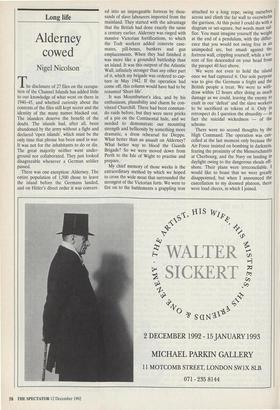Long life
Alderney cowed
Nigel Nicolson
The disclosure of 27 files on the occupa- tion of the Channel Islands has added little to our knowledge of what went on there in 1940-45, and whetted curiosity about the contents of the files still kept secret and the identity of the many names blacked out. The islanders deserve the benefit of the doubt. The islands had, after all, been abandoned by the army without a fight and declared 'open islands', which must be the only time that phrase has been used in war. It was not for the inhabitants to do or die. The great majority neither went under- ground nor collaborated. They just looked disagreeable whenever a German soldier passed.
There was one exception: Alderney. The entire population of 1,500 chose to leave the island before the Germans landed, and on Hitler's direct order it was convert- ed into an impregnable fortress by thou- sands of slave labourers imported from the mainland. They started with the advantage that the British had done exactly the same a century earlier. Alderney was ringed with massive Victorian fortifications, to which the Todt workers added concrete case- mates, pill-boxes, bunkers and gun emplacements. When they had finished it was more like a grounded battleship than an island. It was this outpost of the Atlantic Wall, infinitely stronger than any other part of it, which my brigade was ordered to cap- ture in May 1942. If the operation had come off, this column would have had to be renamed 'Short life'.
It was Mountbatten's idea, and by his enthusiasm, plausibility and charm he con- vinced Churchill. There had been comman- do raids before, but they were mere pricks of a pin on the Continental hide, and we needed to demonstrate our mounting strength and bellicosity by something more dramatic, a dress rehearsal for Dieppe. What better than an assault on Alderney? What better way to blood the Guards Brigade? So we were moved down from Perth to the Isle of Wight to practise and prepare.
My chief memory of those weeks is the extraordinary method by which we hoped to cross the wide moat that surrounded the strongest of the Victorian forts. We were to fire on to the battlements a grappling iron
attached to a long rope, swing ourselves across and climb the far wall to overwhelm the garrison. At this point I could do with a diagram or set-square, but words must suf- fice. You must imagine yourself the weight at the end of a pendulum, with the differ- ence that you would not swing free in an unimpeded arc, but smash against the fortress wall, crippling yourself, while a tor- rent of fire descended on your head from the parapet 40 feet above.
We were not even to hold the island once we had captured it. Our sole purpose was to give the Germans a fright and the British people a treat. We were to with- draw within 12 hours after doing as much damage as we could, leaving the enemy to exult in our 'defeat' and the slave workers to be sacrificed as tokens of it. Only in retrospect do I question the absurdity — in fact the suicidal wickedness — of the scheme.
There were no second thoughts by the High Command. The operation was can- celled at the last moment only because the Air Force insisted on bombing in darkness, fearing the proximity of the Messerschmitts at Cherbourg, and the Navy on landing in daylight owing to the dangerous shoals off- shore. Their plans were irreconcilable. I would like to boast that we were greatly disappointed, but when I announced the cancellation to my doomed platoon, there were loud cheers, in which I joined.


































































 Previous page
Previous page